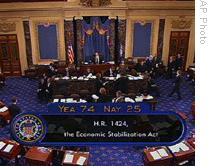VOA慢速英语 2008 1003a
搜索关注在线英语听力室公众号:tingroom,领取免费英语资料大礼包。
(单词翻译)
This is the VOA Special English Economics Report.Wednesday night, the United States Senate passed a rescue bill for the financial industry. A wide majority sent the bill for debate in the House of Representatives. The House rejected its own version on Monday.
 |
| Video image of the final 74-25 vote in the Senate on the Emergency Economic Stabilization1 Act of 2008 |
Like the earlier bill, the new one approves up to seven hundred billion dollars to buy troubled assets. The government would aim to resell them later, maybe even at a profit.
But the Senate added so-called sweeteners for the House. These include tax breaks for businesses and individuals and a temporary increase in federal insurance for bank deposits.
Yet general elections are in a month. Members of Congress know that many Americans hate the idea of what they call a "bailout for Wall Street." Public opinion takers find greater support, however, when the plan is described as a "rescue."
Supporters say it is needed to rescue Main Street, meaning average Americans. Businesses large and small are finding it harder to get credit -- a bad sign for an already weak economy.
One thing is clear: credit demands trust, and there is a lack of it in the financial system. This loss of confidence has led to a flight from risk. Yields on short-term Treasury2 debt recently fell to almost zero. Investors3 were willing to accept almost no interest because they were more interested in safety.
Another recent sign of worry: the LIBOR, the widely used London Interbank Offered Rate. The LIBOR for overnight loans between banks rose above six percent. Banks are holding onto money in case they need it for a sudden increase in withdrawals4.
Another part of the problem is suspicion about the assets that other banks might use to secure a loan. Many financial companies invested in pieces of complex securities based on mortgages and other debt. Spreading the risk this way meant high returns with little danger. Or so they thought.
Then the housing market began to collapse in two thousand six, followed by these securities. No one knows how to value them now. The financial industry has had to report billions in losses because of accounting6 rules.
One rule is called mark-to-market. Companies must mark the value of their assets as the price they would receive if they tried to sell them. But what if the market has collapsed7? Some experts call for a suspension of this rule. In any case, experts say the problem of toxic8 assets must be solved before credit markets will unfreeze.
And that's the VOA Special English Economics Report, written by Mario Ritter
 收听单词发音
收听单词发音 




